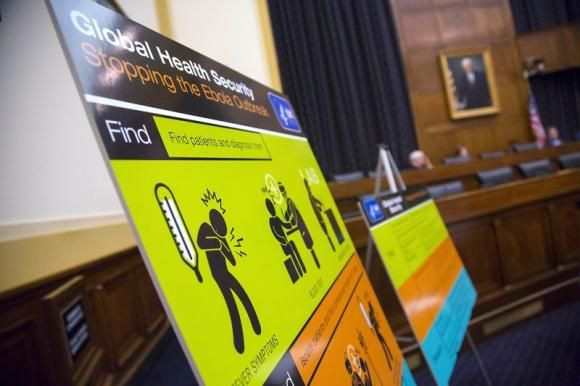US Cuts Resources For Project Involved In Ebola Battle In Sierra Leone

(Reuters) - The U.S. government will not renew funding for a major research project into Lassa fever, a decision that will, in turn, cut resources for a facility in Sierra Leone that is at the forefront of the current battle against the Ebola virus.
The National Institutes of Health rejected a proposal from New Orleans-based Tulane University to renew the five-year contract which expires in November, according to a July 30 letter from NIH reviewed by Reuters. The expiring contract is worth $15 million.
NIH declined to comment on the decision, citing "federal government procurement integrity rules."
The facility, at Kenema Government Hospital, was set up a decade ago to test and treat Lassa fever. Now it is being used to treat patients stricken with Ebola. Both are hemorrhagic fevers caused by distinct families of viruses. Ebola is the most lethal, leading to death in up to 90 percent of cases.
Last week, the facility's director and chief physician, Dr. Sheik Umar Khan, died after becoming infected with Ebola. Its head nurse and two other nurses have also died, and some other staff are sick. The Ebola outbreak, the worst ever recorded, has killed 932 people across Guinea, Liberia, and Sierra Leone.
As part of the Tulane research project, which was designed to identify diagnostics and treatment for Lassa, researchers support the Kenema facility, which has a 5,500 square foot laboratory and similarly sized hospital ward. Blood samples from infected patients are used to develop tests and diagnostics.
Funds from the Tulane project support most of the facility's operations, including $100,000 a year to supplement meager government salaries received by some 30 staff - including doctors, nurses, lab technicians and field workers - said Robert Garry, a professor of microbiology and immunology at Tulane, who heads the program.
The program also supplies laboratory equipment, including protective garments, pipettes, and all materials needed to analyze blood samples.
It is unclear whether the facility will be able to raise funds from other sources to replace the Tulane project money.
FUNDS AVAILABILITY
In the letter to Tulane, a contracting officer for the NIH’s National Institute of Allergy and Infectious Diseases, Liem Nguyen, said the proposal had been rejected “based on technical factors, scientific priority, and availability of funds."
The proposal, the letter added, "falls short of those considered by NIAID to offer the best opportunities for the most successful accomplishment of the acquisition objectives."
NIH declined to provide further comment on the matter.
Dr Anthony Fauci, director of NIAID, said he was unaware of the decision.
It is unclear if U.S. government funding cuts for NIH in recent years contributed to the decision.
The Sierra Leone facility’s resources are strained, members of Tulane’s team say. Dr Daniel Bausch, an associate professor in Tulane’s tropical medicine department, who was at the facility for three weeks in July, said last week that constant fatigue among overworked and poorly trained workers may have led to mistakes. He saw some staff not wearing protective suits. The number of patients in the ward has topped 50, far outstripping its capacity.
Scientists and doctors from the World Health Organization and elsewhere have stepped in to help.
Hemorrhagic fevers, which also include Dengue and Marburg, typically occur in tropical regions of the world and are spread by infected animals, insects or humans.
Erica Ollmann Saphire, a professor at the Scripps Research Institute, which is also involved in the project, said the lab is the only one in Sierra Leone whose permanent role is to test for and treat viral hemorrhagic fevers.
"It has all the instrumentation you need to diagnose diseases," she said.
The program also spends $100,000 a year on a laboratory in Irrua, southern Nigeria. The lab diagnosed the first case of Ebola in that country. It is not currently treating any patients.
Without continued funding, Garry said, researchers will be "scrambling" to find ways to keep the facilities open. Allowing them to close, he added, "is not an option."
The Lassa ward at Kenema has been funded by the United States for more than a decade through a variety of grants and contracts, Garry said.
He said he is hoping other organizations, such as the WHO, may help in the short term, and he is investigating whether there may be ways to pull funds from other projects to finance the Kenema operations..
Over the past decade, Tulane and a consortium of other institutions involved in viral hemorrhagic research has received about $30 million in NIH funding.
© Copyright IBTimes 2025. All rights reserved.





















